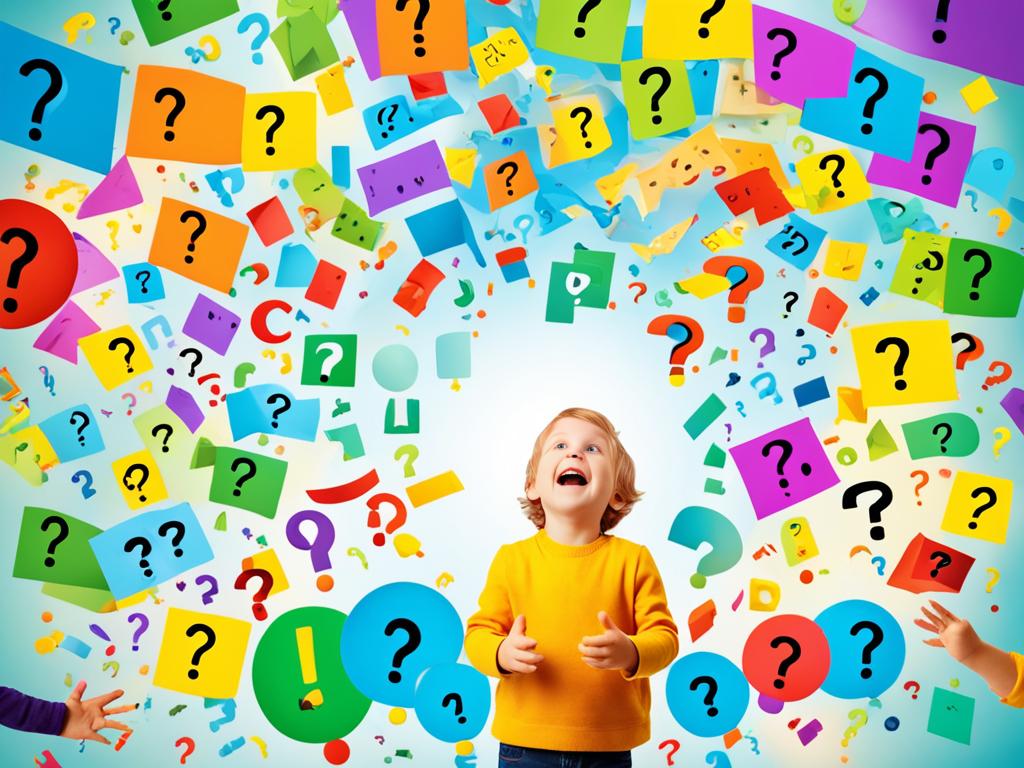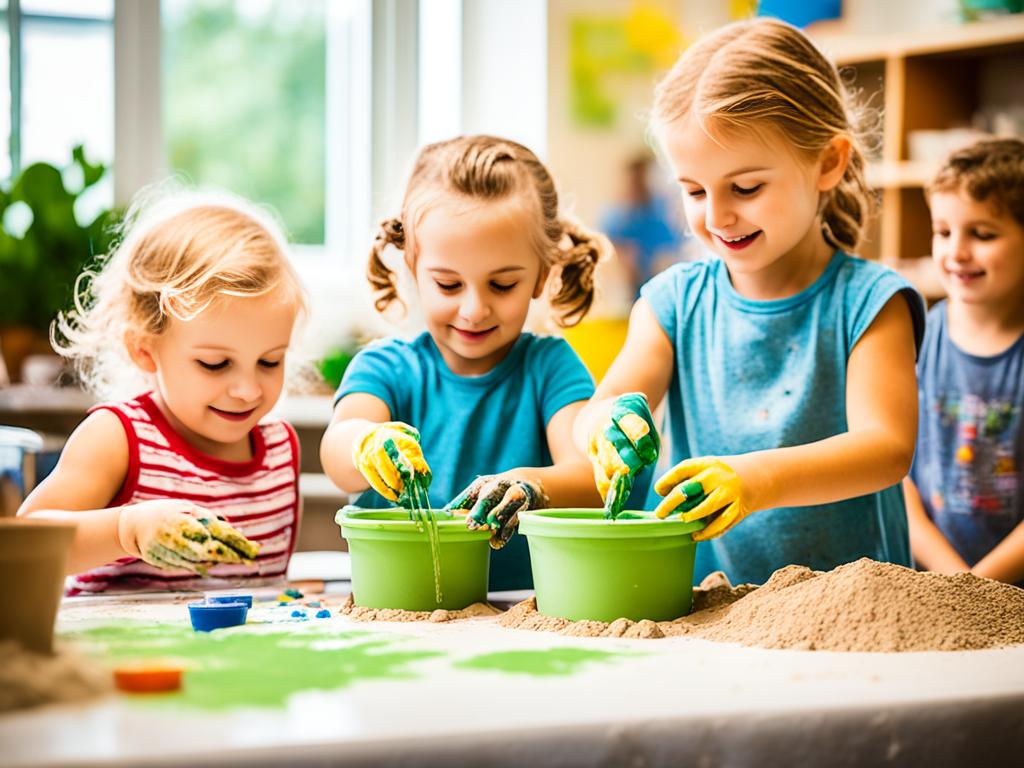Cognitive development is how kids learn and make sense of the world around them.1 They pick up new skills as they get older.1 Parents can help their kids learn and grow by doing fun activities together.1 These help a lot in making their brains work better.1 In this article, we’ll look at how parents and teachers can boost early childhood learning.
Key Takeaways
- Cognitive development is crucial for how children learn, obtain knowledge, and connect with the world around them.
- Parents and educators can support cognitive development through various activities and interactions.
- Engaging in active learning, singing, music, and make-believe play can enhance cognitive skills.
- Reading, problem-solving, and hands-on exploration also contribute to cognitive development.
- Turning everyday interactions into teachable moments, modeling curiosity, and using open-ended questions are effective strategies.
Importance of Cognitive Development in Early Childhood
As kids grow, they get better at remembering things, thinking hard, and staying focused.2 Their minds start to connect ideas, see reasons behind actions, and use logic more as they age.2 Helping them develop these early on is key. It sets the stage for their skills to bloom later.
Enhancing Capacity for Information Retention
By taking part in brain-boosting activities, youngsters remember things better.2 For example, reading every day sharpens the mind, making kids better at shifting thoughts, remembering what they see, and learning more words.2 Then, there’s fun in playing chess. It makes them better at planning, solving problems, handling changes, understanding instructions, and remembering how things look.2
Developing Critical Thinking and Focus
Hitting them with challenging questions gives their brains a good workout.2 This includes understanding what they read, guessing what’s not said, and learning new words.2 Next, imaginary playtime is really smart. It boosts their ability to change plans fast, fix problems, see from others’ views, and build on their words.2
Building Analytical Thinking Skills
2 Hidden in these brainy tasks is the power to join the dots, spot why things happen, and think clearly as they get older.2 Experiencing places like museums and science hubs also hones their thinking, problem-solving, and eyes for detail.2 But it’s not just about special trips. Letting kids find out things by themselves boosts their imagination, helps with hands-on tasks, and sharpens their memory.2
Singing and Music Activities
Listening to music and singing songs helps kids in many ways. Playing musical instruments can make them smarter. Kids who play music for over a year often have higher IQs.3 They also become more patient and learn to try hard, which helps them in life.3 Hearing lots of music makes their brains work better. This helps with memory, paying attention, and solving problems.3
Improving Word Identification and Memory
Singing makes kids remember words better and improves how they hear sounds.3 Music makes kids feel good by releasing a chemical in their brains that brings joy. This makes them happier.3 Plus, it helps them pay attention longer, so they’re better at finishing tasks.3
Enhancing Auditory Sequencing and Information Processing
Starting music early can make kids more emotionally aware and confident.3 Music can also make them less stressed and happier.3 Learning to play an instrument helps their hands and eyes work together. This is good for doing tasks that need careful movement.3
Really good musicians have brains that are very flexible and change in ways that help with memory, moving, and dealing with feelings.3 Special scans have shown that kids who learn to play an instrument link parts of their brain that control touch and movement to the brain parts that deal with different senses. This makes everything work together smoothly, helping with music and thinking.3
Asking Open-Ended Questions
When you play with young kids, asking open-ended questions is key. It helps them grow their language, understand words better, and make guesses.4 These questions link ideas and push kids to think hard and reason well.1
Expanding Language Skills and Verbal Comprehension
Open-ended questions make learning fun. They get kids to explain in their own words. This boosts how well they speak and understand.1 Asking the right question for each kid makes them think deeply.4 It makes learning a strong experience for them.
Developing Inferencing and Reasoning Abilities
Open-ended questions have another great benefit. They make kids link things, guess the answers, and reason out.14 By allowing them time to think, this method deepens their learning experience. It also helps in their brain development.

Engaging in Make-Believe Play
Make-believe play lets kids be anyone or anything they want. This is more than just fun. It helps them think in different ways, solve problems, and see the world from other points of view.5 It also makes their words better and their minds sharper as they pretend to be heroes, parents, or chefs.5
Fostering Cognitive Flexibility and Problem-Solving
Playing without strict rules is key for kids. It lets them figure things out and use their brains in new ways.5 In their made-up worlds, they find creative solutions, learn to think differently, and handle changes smoothly. This is big for their thinking skills.
Understanding Different Perspectives
In pretend worlds, children get to see life through other’s eyes. They learn to care about how others feel and understand different ways of thinking.5 This makes them kinder and better at getting along with everyone, a very important life skill.
Enriching Language Development and Vocabulary
Making up stories is great for talking and learning new words.5 When kids play pretend, they use different words and phrases. This grows their word collection and boosts how well they speak.
Simple toys like play food, dolls, and dress-up make playtime more fun. They help kids use their imaginations and be creative.5 According to Dr. Susan Canizares, playing make-believe is very important. She has a Ph.D. in talking and reading and knows a lot about kids.5
Museum and Science Center Visits
Museums and science centers are great places to learn for kids.6 At these places, kids can listen to experts and see cool things.6 Learning becomes fun and interactive, helping children grow in many ways.6
Acquiring New Knowledge from Experts
Children’s museums let kids choose what they want to learn and how they want to learn it.6 They have lots of activities that make kids think and create.6 Kids also learn how to work with others and talk to different people.6
Enhancing Visualization Skills and Logical Thinking
Children’s museums are full of fun, learning activities that spark a child’s curiosity.6 Kids get to explore and learn in a way that feels like playing.6 This kind of learning helps in many ways. Kids become stronger and smarter. It also brings families closer together.6
Daily Reading Activities
Reading books every day with your child can really boost their thinking skills. They learn how to create images in their mind and remember things visually. This makes their memory sharper7. They also pick up new words and ideas when listening to stories, which helps grow their vocabulary and makes them more flexible thinkers7.
Developing Visual Memory and Mental Imagery
Kids build up their ability to imagine and remember things through reading. They get better at making mental pictures from words and stories7. This makes understanding and remembering what they read a lot easier. It’s like exercise for their brain.
Expanding Vocabulary and Cognitive Flexibility
Reading every day introduces children to lots of new words and concepts. They start to know and understand more words, which makes their vocabulary bigger. At the same time, they learn to be more flexible in how they think, making new connections and figuring things out in different ways7.
Encouraging Independent Problem-Solving
It’s vital to let children solve problems on their own.2 This helps their brains grow stronger. They learn how to solve problems by themselves.2 This boosts their thinking and logic skills.2
When kids explore and find answers alone, they grow a lot.1 They learn a lot about the world. This makes them feel good and believe in themselves.1 It’s key to know what they like and help them when needed. Talking with adults can also help a lot.1
Letting kids figure things out by themselves is great.2 It helps develop skills like thinking logically and solving problems.2
Letting kids solve problems on their own has many good points. They become good at handling tough situations.1 Plus, they learn to be flexible and tough.1 Learning from friends is a good idea too. And it’s important to think about how culture affects how kids learn.1
How to Support Cognitive Development in Children: Tips for Parents and Educators
Cognitive development helps children learn, connect ideas, and think deeply. Parents and teachers play a crucial role in fostering this growth. One way is through board games and strategic activities. Developing logical thinking and problem-solving skills is also vital.
Teaching Board Games and Strategy
Playing challenging board games improves cognitive skills in kids.2 It enhances skills like planning and decision-making, among others. Chess, for instance, boosts logical thinking, problem-solving, and even language skills.2 It pushes children to use their minds in strategic and analytical ways.
Promoting Logical Thinking and Problem-Solving Skills
Besides board games, it’s helpful to let kids solve problems on their own.2 This approach hones their logical reasoning and adaptability.2 It encourages independent critical thinking and understanding the world.
Overall, including board games and independent problem-solving in kids’ activities is crucial. It sets a solid foundation for their academic and personal success.
Hands-On Exploration Activities
Letting kids explore the world by using their senses benefits their thinking and learning in many ways.8 These activities boost their memory, sense of touch, and ability to solve problems. As they touch, smell, taste, look at, and listen to new things, kids grow smarter.8
Enhancing Cognitive Flexibility and Memory
Hands-on activities make kids think in new ways and remember things better.8 When they touch and observe things closely, kids learn to solve problems creatively. Plus, this mix of senses helps them remember lots of information.8
Developing Tactile Sensation and Problem-Solving
Feeling objects and facing challenges in hands-on activities makes kids understand the world better.8 As they touch and handle items, children improve their sense of touch. They also get really good at solving problems, which is key for developing sharp thinking.8

By supporting kids in exploring through senses, both parents and teachers open many doors for learning. These experiences are crucial for kids to learn and succeed.89
Role of Interactions in Cognitive Development
Both adults and peers hugely impact how a child thinks.1 Parents and teachers shape these experiences into lessons. They help kids grow smarter through everyday talks and activities.1
Turning Interactions into Teachable Moments
Watch what kids like and need; this shows the best times to teach them.1 By showing how to do something, adults boost kids’ skills. This makes learning fun and effective.1 Giving clear feedback and praise helps even more. It lets kids know they’re on the right track.1
Modeling Curiosity and Engagement
In games and activities, adults can lead kids to think in new ways. This makes their minds grow.1 Choosing how to interact with kids carefully fosters deeper thinking.1 It’s also key to match the teaching to the child’s culture. This makes learning more relevant and powerful.1
Using Open-Ended Questions and Descriptive Feedback
Asking open questions gets kids talking and thinking.1 When kids find things hard, kind words are crucial. They help kids stay positive and keep trying.1 Learning with friends is great too. It sharpens their thinking.1 Sharing teaching duties among kids also helps. Everyone learns more this way.1
Source Links
- https://www.virtuallabschool.org/school-age/cognitive-development/lesson-3
- https://thepillarsclc.com/how-to-promote-cognitive-development-in-early-childhood/
- https://growing-sound.com/the-impact-of-music-on-cognitive-development-in-children/
- https://www.naeyc.org/resources/pubs/tyc/feb2019/asking-questions-stretch-children’s-thinking
- https://www.montessori.com/blog/2020/09/make-believe-is-magically-educational/
- https://mhdm.org/role-of-childrens-museums/
- https://positivepsychology.com/cognitive-development-activities/
- http://resourcesforearlylearning.org/educators/module/20/15/75/
- https://www.virtuallabschool.org/fcc/cognitive-development/lesson-8


